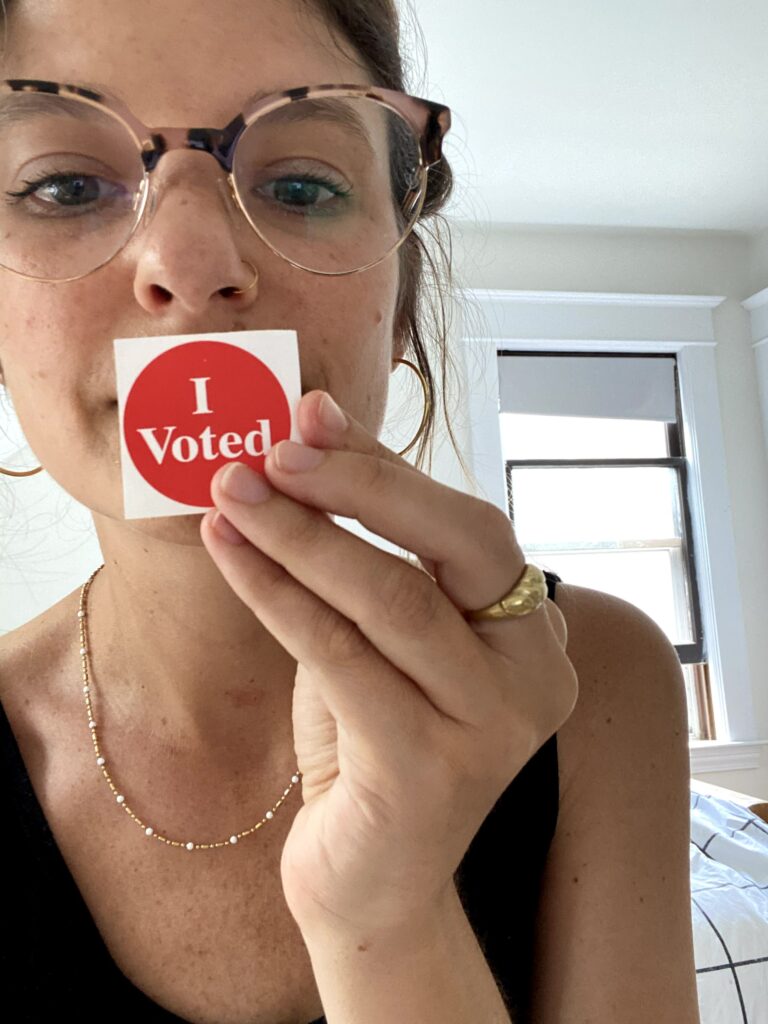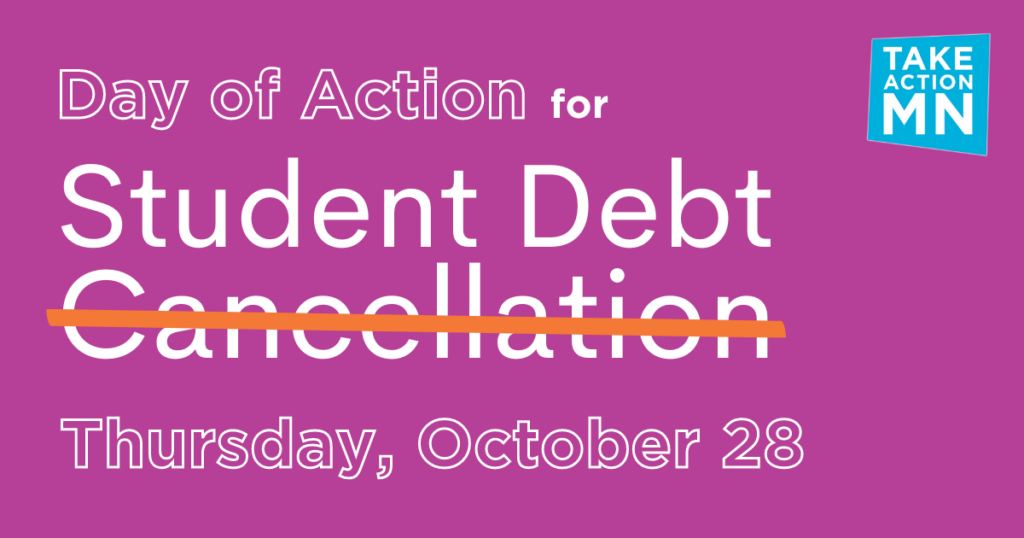My student debt story starts with my love of learning. I grew up in a small town in southwest Michigan, where I attended the only public school in our town. School allowed me the chance to analyze the world — its conflicts and art and ecology and stories — and imagine new possibilities for it. I loved it so much that after graduating from the University of Michigan, I became an English teacher, teaching first in New York City and then Chicago and now in St. Paul. I love to read beside my students, thinking about others’ stories and creating our own.
Because my parents didn’t have incomes that would allow them to save tuition money, and because I was a first-generation college student encountering a confusing and predatory lending system for the first time, I took out too many loans to attend college, including private loans with high interest rates. My parents’ credit was poor, so my immigrant grandparents co-signed many of my loans, and in the years after graduation when I missed payments because I couldn’t pay or because of errors on the part of the lender, I would receive a call from my grandmother who had been contacted by the lender. “Are you okay?” She’d ask me. Followed by: “I’m sorry that we don’t have enough money to help you.” Debt is often a shared shame, in the way its cruelty tethers us to loved ones, and in the way it forces us to announce our debt status as we navigate apartment rentals, car loans, relationships, etc.
Today, I have about $40,000 in student debt, the bulk of which is private. Since graduating from college, I’ve paid off around $80,000, an amount that would have allowed me to attend my undergrad institution, the University of Michigan, several times. In my twenties, when my loan payments were about $600 a month, I worked multiple jobs, tutoring after school or on the weekends, teaching night school classes and summer school classes, and running after-school clubs, so that I might stay ahead of the debt payments. I was so focused on making enough money to pay toward an ever-expanding debt burden that I was unable to take the career journeys afforded to those without student debt (in other words: the rich). Of everything painful that I’ve experienced because of this debt — from illness caused by stress, to trouble finding landlords who will rent to me, to sleepless nights because of work — this loss of self-exploration hurts the most. I wonder who I might have become had I been given this chance, and how I might have evolved had I not felt each day as if I was barely avoiding financial death.
In telling my own debt story, it’s impossible not to use language that conveys my sense of blame (“I took out too many loans”) when in fact the blame lies elsewhere: on the industries and institutions that indebt us. I joined the Debt Collective, the country’s first debtor union, because the language I had to talk about my experience felt inaccurate and incomplete — because the story I’d inherited was wrong. The missing part of my debt story is this: following World War II, college tuition was free or affordable enough that students could often pay for it by working part-time or summer jobs. As we shifted from a tax state (in which taxes are collected from wealthy individuals and corporations to fund public services) to a debt state (in which individuals are forced to pay for privatized services that were once public goods), funding for colleges was cut and tuition soared to cover the gap while wages have remained stagnant. So today, if you want to attend college and do not have family wealth to draw upon, you have to take out student loans to do so. Our government chose wealth over people, and now we’re here.
When I joined the Debt Collective, I also joined a subset of collective members who were on a debt strike. We were known as the Biden Jubilee 100: 100 strikers for Biden’s first 100 days in office. And like striking workers withholding their labor, we withheld our debt payments, demanding President Biden abolish student debt, which he can do by executive order. Individually our debts make us vulnerable, but collectively, our debts make us powerful. When I joined the Debt Collective, I felt that power striking beside allies and friends, attending political education events, and creating an honest language to tell the right stories about debt and debtors. While my debt has often forced me to into painful moments of disconnection, like navigating apartment rentals with a new roommate, or painful moments of isolation as I tried very hard to keep my debt a secret, the Debt Collective turned my experience with debt into a source of knowledge and an opportunity to be in community with people. In our meetings together, we get angry, we laugh, we offer empathy. We grapple with the world we’re living in while imagining something better. We are in debt not because of bad choices but bad policy, and another world is possible: one WITHOUT utility debt, WITHOUT medical debt, WITHOUT carceral debt, and WITHOUT student debt. In this world, there is healing, healthcare, housing, and education for all.
I encourage those living with debt to join us. Whether you’re showing up for a political education event, sharing a story with a collective member, using our consumer and healthcare debt dispute tools, getting advice in our forums, please connect with us in the movement to #CancelStudentDebt and work toward #FreeCollegefor all. Having debt has made me feel lonely and scared, but organizing to abolish it has brought me incredible joy and community.
We’re taking action for student debt cancellation on Thursday, October 28th. Join us and share your story on social media: Why is immediate student debt cancellation necessary, and what would debt cancellation mean for you?
All are welcome to participate: whether you have debt or not, we all have stories to share about this crisis.


